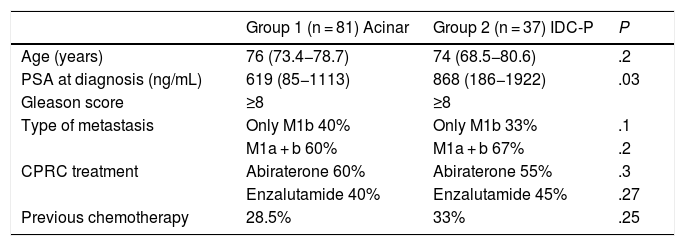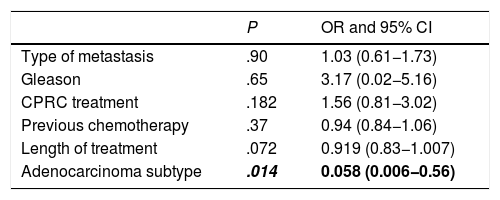Most prostate cancers are classified as acinar adenocarcinoma. Intraductal carcinoma of the prostate (IDC-P) is a distinct histologic entity that is believed to represent retrograde spread of invasive acinar adenocarcinoma into prostatic ducts and acini.
We have analyzed the impact of IDC-P in hormonal naïve and castration resistant metastatic prostate cancer patients.
Patients and methodsWe retrospectively evaluated 118 metastatic castration resistant prostate cancer (mCRPC) patients who were initially diagnosed with distant metastases from May 2010 to September 2018. Group 1 patients included 81 metastatic PCa patients with acinar adenocarcinoma and Group 2 included 37 metastatic PCa patients with IDC-P.
ResultsMean age at presentation was 76 years (IQR 73.4−78.7) in group 1 and 74 years (68.5−80.6) in group 2. Mean PSA at diagnosis was 619 ng/mL (IQR 85−1113) and 868 ng/mL (IQR 186−1922), respectively. Time to castration resistance was 24.7 months (IQR 16.7–32.7) in group 1 and 10.2 months (IQR 4.2–16.2) in group 2 (P = .007). Time to progression in CPRC patients was: 10.6 months (IQR 5.6–15.6) and at 6.2 months (3.2–9.2), respectively (P = .05). Overall survival was 57.9 months in group 1(CI 95% 56.4–59.5) and 38 months (CI 95% 19.9–48.06) in group 2 (P = .001). In the multivariate analysis, adenocarcinoma subtype was statistically significant P .014, CI 95% (HR 0.058, 0.006−0.56)
ConclusionsIDC-P seems to be a subtype of prostate cancer that is associated with a shorter response to hormonal treatment when compared to acinar adenocarcinoma in metastatic patients. New drugs in CRPC scenario as abiraterone and enzalutamide also obtained less response in IDC-P patients. Once IDC-P is identified, clinicians could extrapolate the relative poor response to hormonal therapy. Consequently, follow-up of these patients in this scenario should be more strict.
La mayoría de los cánceres de próstata se clasifican como adenocarcinoma acinar. El carcinoma intraductal de la próstata (CIDP) es una entidad histológica distinta que se cree que representa la propagación retrógrada del adenocarcinoma acinar invasivo en los conductos prostáticos y acinos.
Hemos analizado el impacto del CIDP en pacientes con cáncer de próstata resistente a la castración metastásico y sin tratamiento hormonal previo (hormone-naïve).
Pacientes y métodosEvaluamos retrospectivamente a 118 pacientes con cáncer de próstata resistente a la castración metastásico (CPRCm) con diagnostico inicial de metástasis a distancia desde mayo de 2010 hasta septiembre de 2018. El grupo 1 incluyó 81 pacientes con CaP metastásico con adenocarcinoma acinar y el grupo 2 incluyó 37 pacientes con CaP metastásico con CIDP.
ResultadosLa edad media de presentación fue de 76 años (RIC 73,4–78,7) en el grupo 1 y de 74 años (68,5–80,6) en el grupo 2. El valor medio del PSA en el momento del diagnóstico fue de 619 ng/mL (RIC 85–1113) y 868 ng/mL (RIC 186–1922), respectivamente. El tiempo hasta la resistencia a la castración fue de 24,7 meses (RIC 16,7–32,7) en el grupo 1 y 10,2 meses (RIC 4,2–16,2) en el grupo 2 (P = ,007). El tiempo hasta la progresión en los pacientes con CPRC fue: 10.6 meses (RIC 5.6–15.6) y 6.2 meses (3.2–9.2), respectivamente (P = .05). La supervivencia global fue de 57,9 meses en el grupo 1 (IC 95% 56,4–59,5) y de 38 meses (IC 95% 19,9–48,06) en el grupo 2 (P = ,001). En el análisis multivariante, el subtipo de adenocarcinoma fue estadísticamente significativo P .014, IC 95% (HR 0.058, 0.006–0.56)
ConclusionesEl CIDP parece ser un subtipo de cáncer de próstata que se asocia con una respuesta más corta al tratamiento hormonal cuando se compara con el adenocarcinoma acinar en pacientes con cáncer metastásico. Los nuevos fármacos en el escenario del CPRC como la abiraterona y la enzalutamida también obtuvieron una menor respuesta en los pacientes con CIDP. Una vez identificado el CIDP, los médicos podrían extrapolar la relativamente mala respuesta a la terapia hormonal. Por consiguiente, el seguimiento de estos pacientes en este escenario debería ser más estricto.











